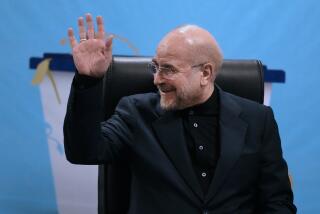Allawi to Run for Election, but With Whom?
- Share via
BAGHDAD — Interim Prime Minister Iyad Allawi formally threw his hat into the ring Wednesday for Iraq’s Jan. 30 election, announcing a slate of 240 candidates that is likely to become a key contender in the race.
But Allawi, who will head the slate, delayed his announcement by several hours Wednesday morning and declined to release other names on his list. That raised speculation about last-minute haggling behind the scenes.
In particular, it was unclear whether interim President Ghazi Ajil Yawer would join Allawi’s list of candidates for the new national assembly or form his own slate. Voters will choose from among the lists, rather than select individual candidates. The elected assembly will be charged with appointing a new prime minister and drafting a permanent constitution.
Allawi’s much-anticipated announcement came on the first official day of campaigning. Major political parties said they expected to keep a low profile during the race because of Iraq’s security problems.
On Wednesday, a senior Shiite Muslim cleric in Karbala narrowly escaped assassination when a bomb exploded as he was traveling to evening prayers at the Imam Hussein shrine, one of Shiite Islam’s most sacred sites.
Sheik Abdul Mehdi Karbalai, a close associate of top Shiite cleric Grand Ayatollah Ali Sistani, was wounded in the leg during the attack. The blast killed seven people, including two of Karbalai’s bodyguards, and wounded 39.
Sistani has been a leading proponent of elections and helped craft a Shiite-dominated platform of candidates known as the United Iraqi Alliance. One of those candidates, Sayed Salem Yaqoubi, was killed Saturday in Baghdad, an official from the Supreme Council for Islamic Revolution in Iraq said Wednesday.
Election officials fear that the violence will only increase as the nation prepares to go to the polls next month.
In Sunni Muslim cities, such as Ramadi and Samarra, candidates are too afraid to campaign, said Alaa Makki, political advisor to the Iraqi Islamic Party, a Sunni group pushing to delay the election.
“Even the people who were distributing voter registration forms have been threatened,” Makki said. “If we tried to campaign in Sunni areas, we might be killed.”
He said the party had asked election officials not to release addresses of its candidates out of concern for their safety.
Makki said his party’s candidates were also worried about the role of U.S. forces in the campaign. He said one candidate on the slate recently had been arrested by the military based on what he called false allegations by a rival. The man was released seven days later, he said.
“The situation is so unstable now,” Makki said.
At a news conference Wednesday in Baghdad, Allawi said security and national unity would be the top priorities of his slate, which he said would “stay far away from political and religious fundamentalism.”
But without seeing the specific names, rival political groups said, it was hard to gauge how representative Allawi’s slate, or platform, would be. The inclusion of Yawer, a Sunni Muslim who has said he might offer his own list, would be key, political experts said.
“That would give him a broader platform,” said Saad Jawad, head of the political bureau for the Supreme Council, the leading Shiite party.
The United Nations reported Wednesday that it planned to open offices in the Iraqi cities of Basra and Irbil to help organize the January balloting. Four or five staff members would be assigned to each office. The U.N. currently has about 20 election workers in Iraq.
*
Times staff writer Maggie Farley at the United Nations and a Times special correspondent in Iraq contributed to this report.
More to Read
Sign up for Essential California
The most important California stories and recommendations in your inbox every morning.
You may occasionally receive promotional content from the Los Angeles Times.










